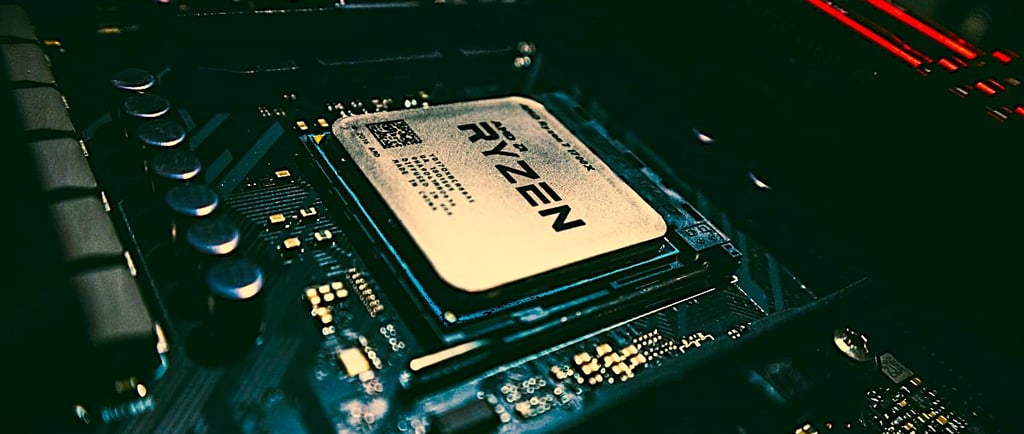AMD Ryzen 9 7950X Review: Performance, Features, and Is It Worth It?
Covering everything from its 16-core Zen 4 architecture to the exclusive DDR5 and AM5 platform requirements, the review offers insights into how the 7950X excels in productivity workloads and rendering tasks while addressing concerns like high platform costs and thermal management.
NEWS


AMD Ryzen 9 7950X Review: Performance, Features, and Is It Worth It?
Today, I want to review the AMD Ryzen 9 7950X CPU, which supports 16 cores and 32 threads, based on Zen 4 architecture. This model launched in September 2022 with a price tag of $699. Today's MSRP (Manufacture Suggested Retail Price) dropped to $465. What makes this model even better in terms of price and performance ratio. I will examine both the strengths and weaknesses of this product to provide a balanced and thorough understanding
Specifications and Platform Changes
The Ryzen 9 7950X comes with new, fast Zen 4 cores manufactured on TSMC's 5nm process. AMD continues using its chiplet design, meaning that this processor comes with two 8-core CCDs and an I/O die. The latter has been significantly shrunk down to the TSMC 6nm process. The CPUs feature integrated graphics for the first time in AMD's Ryzen 7000 lineup. The iGPU performance, however, is quite low.
What cannot be overlooked is that for the Ryzen 7000 CPUs, AMD has transitioned to an LGA socket aimed at AM5. This means that CPUs no longer come with pins, marking the start of a new era for AMD processors. Unfortunately, this forces consumers to buy new motherboards. Chipset options include X670E, X670, B650E, and B650. Robust power delivery and support for PCIe 5.0 drive motherboard pricing higher, and DDR5 RAM is mandatory, unlike Intel's Alder Lake and Raptor Lake platforms, allowing users to stay with DDR4 temporarily. This decision significantly drives up platform costs. On the bright side, AMD has committed to supporting the AM5 platform until 2025, providing some assurance for long-term upgrades.
Test Setup and Clock Speeds
For my test setup, the 7950X was installed on the ASRock X670E Taichi Carrara motherboard, which boasts phenomenal marble aesthetics and an impressive feature set. For RAM, I used the Kingston Fury Beast RGB with 32GB at 6000 MHz, featuring an EXPO profile specifically optimized for AMD CPUs. As for the GPU, I used the ASUS RTX 3090 TUF Gaming OC to minimize bottlenecks.
The Ryzen 9 7950X initially clocks at about 5.14 to 5.17 GHz under full load. Interestingly, I noticed a difference in clock speeds between the first and second CCDs, with the second CCD clocking slightly lower—a variance of up to 100 MHz. After extended stress testing, clock speeds dropped slightly but remained consistent. The maximum boost clock I observed was 5.465 GHz, which is below AMD's stated 5.7 GHz maximum.
(Read more about frequency boost HERE.)
Productivity and Gaming Performance
In terms of productivity workloads, the Ryzen 9 7950X managed to take the crown in almost every test, outperforming even the Threadripper 24-core model. This showcases how much faster these individual 16 cores have become. The gains over both the Ryzen 9 5950X and Intel Core i9-12900K are undeniable. For workstation tasks and rendering workloads, the 7950X is simply incredible. Even gaming performance impresses, with the 7950X claiming the top spot in many titles. However, AMD's 7950X struggled to keep up with Intel's 12th Gen offerings in a few specific games.
Thermal Performance and Power Consumption
High CPU temperatures are a major concern. Even with a 360mm AIO liquid cooler, temperatures reached 95°C during stress tests. AMD claims this is by design and safe for 24/7 use. The unusually thick heat spreader design seems to contribute to this issue. Additionally, only certain AM4 CPU coolers are compatible with AM5, and compatibility is limited to those using AMD's integrated socket backplate. Modified mounting kits are required for others.
Idle power consumption is another weakness. While the maximum power draw under load is acceptable, the idle power draw of 123W feels excessive, given the performance. Disabling one of the CCDs significantly reduces idle power consumption but defeats the purpose of owning a 16-core processor.
Recommendations and Final Thoughts
Would I recommend the Ryzen 9 7950X for gaming? Not as the primary reason for purchase. The platform costs are too high, considering the marginal FPS gains in most games. A better choice for gaming would be the Ryzen 7 5800X3D or Intel's 12th/13th Gen CPUs paired with DDR4 RAM, which offer better value. For productivity tasks like rendering, encoding, and multitasking, the Ryzen 9 7950X is a powerhouse and an excellent choice for a workstation setup that can double as a gaming machine.
The AMD Ryzen 9 7950X is undoubtedly an impressive CPU!

